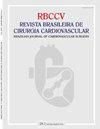二尖瓣环钙化与控制营养状况评分的关系
IF 1.2
4区 医学
Q4 CARDIAC & CARDIOVASCULAR SYSTEMS
Revista Brasileira De Cirurgia Cardiovascular
Pub Date : 2022-06-08
DOI:10.21470/1678-9741-2020-0443
引用次数: 1
摘要
引言二尖瓣环钙化(MAC)与控制性营养状况(CONUT)评分之间的关系以前没有研究过。在本研究中,我们调查了MAC和CONUT评分之间的关系,以评估MAC患者的营养状况。方法共有275名患者,包括150名MAC患者和125名非MAC患者,在心脏病学门诊就诊。结果两组CONUT评分无明显差异。相关分析表明,MAC+组的CONUT评分与左心房(LA)直径(r=0.190,P=0.020)和室间隔厚度(r=0.179,P=0.028)呈正相关。在多变量回归分析中,只有左心房直径(比值比95%置信区间=1054~189,P=0.0001)与MAC独立相关。结论本研究首次探讨了CONUT评分与MAC的关系。我们证明,在没有慢性病的MAC患者中,CONUT评分并不显著更高。然而,MAC患者的CONUT评分与LA直径相关。因此,我们得出结论,对于MAC和LA直径高的患者,CONUT是一个有价值的营养和炎症状态指标。本文章由计算机程序翻译,如有差异,请以英文原文为准。
The Relationship Between Mitral Annular Calcification and Controlling Nutritional Status Score
Introduction The relationship between mitral annular calcification (MAC) and the controlling nutritional status (CONUT) score has not been previously studied. In this study, we investigated the relationship between MAC and CONUT score to evaluate the nutritional status of patients with MAC. Methods A total of 275 patients, including 150 patients with MAC and 125 patients without MAC, who presented to a cardiology outpatient clinic were enrolled in the study. Results There was no difference in the CONUT score between the two groups. Correlation analysis indicated that CONUT score was positively correlated with left atrial (LA) diameter (r=0.190, P=0.020) and interventricular septum thickness (r=0.179, P=0.028) in the MAC+ group. In multivariate regression analysis, only LA diameter (odds ratio 95% confidence interval = 1,054-1,189, P=0.0001) was independently associated with MAC. Conclusion The present study investigated the relationship between CONUT score and MAC for the first time in the literature. We demonstrated that CONUT score was not significantly higher in patients with MAC without chronic diseases. However, CONUT score was correlated with LA diameter in patients with MAC. We therefore conclude that, for patients admitted with MAC and high LA diameter, CONUT is a valuable nutritional and inflammatory status index.
求助全文
通过发布文献求助,成功后即可免费获取论文全文。
去求助
来源期刊

Revista Brasileira De Cirurgia Cardiovascular
CARDIAC & CARDIOVASCULAR SYSTEMS-SURGERY
CiteScore
2.10
自引率
0.00%
发文量
176
审稿时长
20 weeks
期刊介绍:
Brazilian Journal of Cardiovascular Surgery (BJCVS) is the official journal of the Brazilian Society of Cardiovascular Surgery (SBCCV). BJCVS is a bimonthly, peer-reviewed scientific journal, with regular circulation since 1986.
BJCVS aims to record the scientific and innovation production in cardiovascular surgery and promote study, improvement and professional updating in the specialty. It has significant impact on cardiovascular surgery practice and related areas.
 求助内容:
求助内容: 应助结果提醒方式:
应助结果提醒方式:


